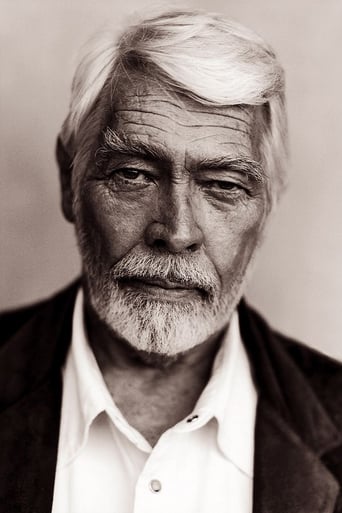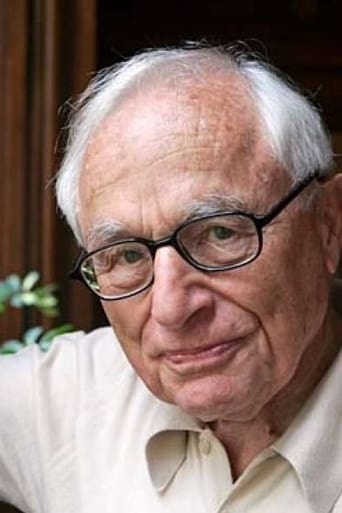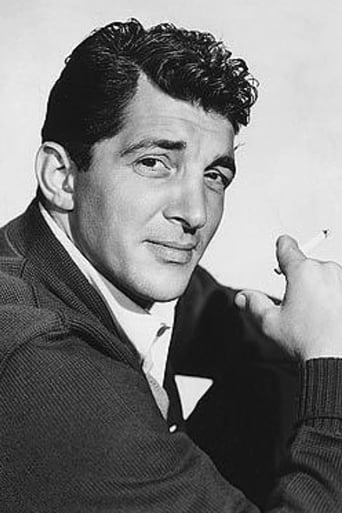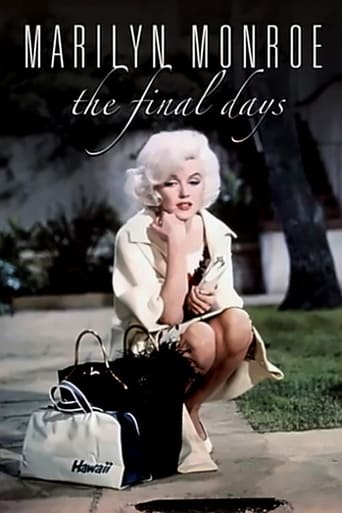
Marilyn Monroe: The Final Days
June. 01,2001Marilyn Monroe's final project, "Something's Got to Give", has become one of the most talked about unfinished films in history. The story of the film and Marilyn's last days were seemingly lost… until now. Through interviews, never-before-seen footage and an edited reconstruction of "Something's Got to Give", Marilyn Monroe: The Final Days provides a definitive and fascinating look at the last act in the life of the world's most famous and tragic superstar.
Similar titles


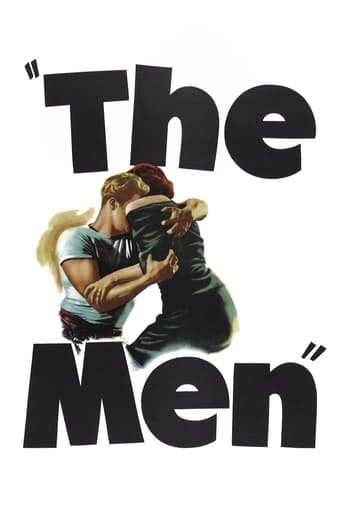
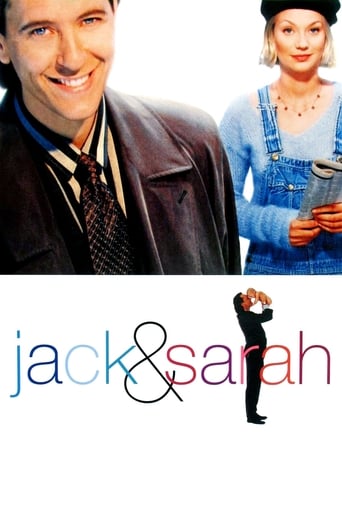

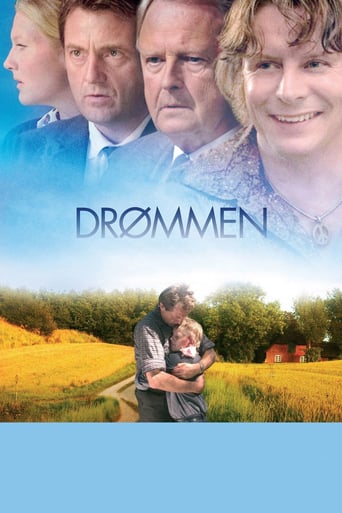
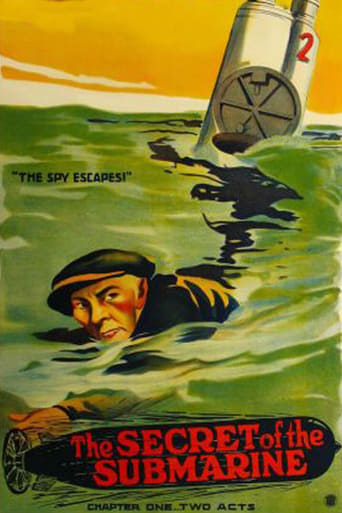

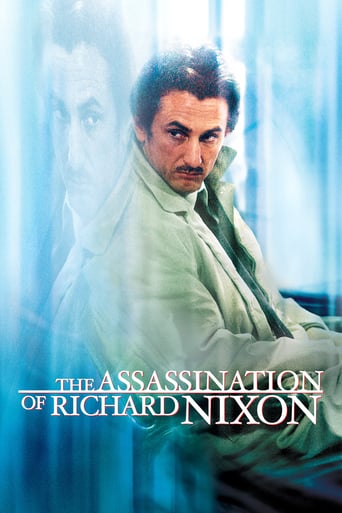
Reviews
Great Film overall
Brilliant and touching
The film may be flawed, but its message is not.
The movie is made so realistic it has a lot of that WoW feeling at the right moments and never tooo over the top. the suspense is done so well and the emotion is felt. Very well put together with the music and all.
The events surrounding the sad, trouble-plagued 1962 production of Marilyn Monroe's last (and unfinished) film "Something's Got To Give" are covered in this thoughtful and reasonably balanced documentary. Regardless of whether or not the viewer is a Monroe fan- or is particularly interested in Hollywood lore- there's an undeniable pull to this offering, not unlike the interest one would experience upon learning of unearthed, previously unknown recordings by a favorite long-deceased singer. This is a rare all-too-brief glimpse of what might have been.No one denies Monroe was a troubled individual and a difficult actress, and the frustrations of working with her were academic long before she signed to do this film. 20th Century Fox, her home studio for which she was making the film, and the film's reluctant director George Cukor, knew all too well what to expect (and what not to expect) from her. The documentary does a good job of detailing the dire financial situation Fox was in at the time, and how this served to put undue pressure on the production. Almost bankrupt due to the huge cost overruns and delays on their colossal epic "Cleopatra" (in it's third year of production by '62), the studio desperately needed a hit, and they needed it fast. But "Something's Got To Give" wouldn't be it.The basis for this documentary stems from the painstaking restoration of the long-forgotten reels from the film that narrator James Coburn states totaled nine hours of footage. An edited "reconstruction" of "Something's Got To Give" comprises the final part of this feature, which is also its most sadly poignant. We settle into watch what amounts to a typical piece of early-1960's harmless fluff, at times clever and witty with some good comic chops. Aside from a scene where Dean Martin's character seems surprisingly unsurprised to see his "dead" wife (indicating the absence of an earlier scene), the film moves along fairly smoothly. Lulled (as I was) into thinking that nine hours of footage is certainly enough from which to extract a coherent complete film, everything suddenly comes to an unexpected end as an off-camera Cukor says "cut!", and all too soon, there's nothing more to see. The film's reconstruction runs for only about 37 minutes, despite the fact that practically all scenes where Monroe's presence wasn't required made it onto film, as the studio worked around her frequent absences. But having continued the reconstructed film without crucial missing scenes involving Monroe would have been somewhat pointless. Fox would remake the movie with a different cast in 1963, entitled "Move Over, Darling" which would give the viewer a reasonable idea of what "Something..." might have looked like had it ever reached the screen. What precious little usable footage we saw of Monroe in the first segments of this feature is apparently all there was. This is part of what makes "Marilyn- The Final Days" so oddly compelling.
Marilyn Monroe had it all, as a successful star really. Lots of adoring fans, movies that were pitched at a particular audience - for those who loved to see 'Marilyn' on screen, in her beauty, her charm, her humor, and on good occasions her dramatic skill - and a helluva strong studio contract for her bankability. But what she didn't have was piece of mind. She was troubled since her youth, and her "manic-depressive" nature, along with some other genuine problems, caused her to basically flunk out of her stardom in Hollywood. Of course, this is the blanket statement, as the documentary makes clear she could have come back to finish the film she was originally fired from her vehicle, Something's Got to Give. What spurred on that last night when she left the mortal coil is still speculation, some forty years on after the fact (that is when this documentary was made in 2001).What remains fascinating throughout this look at Monroe's last days was to see how her own fragility contrasted in a similar way to the fragility of Hollywood, specifically Fox at the time, in 1962. Fox needed a solid hit to offset the production nightmare of Cleopatra, but they also had a kind of double-edged sword to yield: like Elizabeth Taylor, Monroe was unreliable as someone who could get to work on time with the schedule made out by the filmmakers, and as costs escalated Studio chiefs (as they are to do often) got uneasy. We learn that Monroe's tardiness (that is her on a good day) was already notorious. But a bad cold-cum-flu that kept her away from the shoot for almost the first three weeks of filming made things very tense on the set. And even to this day the "illness" claim has to be taken from her former doctor, or those who knew her. One of the interviewees says it best: "I could buy she was sick, up to a point - but it was also the drugs." How ironic then that the documentary shows how in other ways the production got muddled with its organization. Take the example of when Monroe does finally get to the set to do some work, and the first thing done is a scene with a dog that doesn't bark on cue. What were they thinking, one might ask, that as soon as the big star is on set to tool around with a mangy mutt? The Final Days doc does give fans, or just curious and casual movie buffs, glimpses of what might have been of Cukor's film, including a rather infamous scene where Monroe skinny dips in a pool to distract Dean Martin's character (and, indeed, she did it for real - how "method" of her, after all), and some so-so funny scenes with the other actors.Actually, the documentary also includes the entire 'restored' version of Cukor's film, all 37 minutes that was filmed (mostly the scenes without Monroe), though oddly enough seeing that was just OK. For a big movie buff it doesn't bring the same thrill as, say, when in the 90's Paramount released Orson Welles' complete filmed segment in It's All True. It's simply a fluffy romantic comedy that was a remake to start with and something that, perhaps throughout deep down, Monroe wasn't crazy to work on. The history and the politics of the studio, and Monroe's intentional (Kennedy birthday bash) or unintentional (getting sick, either for real or psychosomatic) means of mucking up the production, proves to be much more valuable, even when getting the stories and information from sources that could be just making stuff up. The producer Henry Weinstein might appear to be one of these at first, though he talks about how fair he really was to her, while her entourage of Strasberg (damn you, method!) and her publicist hurt, not helped, her mental state.The documentary is shaped like a tragedy, and so there's the double-twist that Monroe was trying to get back on track before she died, that it wasn't just a two-month depression bender after she got fired (and, perhaps, this isn't unbelievable as she could pull a few good strings in Hollywood when she needed). This structure makes it conventional, but it's never really dull, and only at the end does the music and James Coburn's narration become too cheesy and melodramatic. Up until then, and before it gets to the restored Cukor footage, it's an engrossing story of stardom gone awry, and it's both beautiful and haunting to see when Monroe was "ON" on the set, it was one of the most wonderful things to see. The darker parts, however, can really only be filled in by the audience.
Archival footage and contemporary interviews provide a glimpse into the final six months of the life of Marilyn Monroe. The documentary spans the time from February, 1962, until her death in August, 1962, using benchmark dates, usually associated with the film she was making at the time: "Something's Got To Give". The film was never finished.Interviews include Producer David Brown, Associate Producer Gene Allen, Producer Henry Weinstein, Writer Walter Bernstein, and actress Cyd Charisse. Throughout the documentary, Marilyn comes across as physically lovely, playful, emotionally insecure, a tad irresponsible, temperamental, eager to learn, vulnerable, and dependent on sleeping pills.One segment has B&W footage of her as she shows up tardy at the May 19th birthday celebration of then President John Kennedy, just weeks before she died. When she finally appears on-stage, host Peter Lawford introduces her to the audience: "Mr. President, the late Marilyn Monroe".The Monroe documentary runs about 77 minutes. The remainder of the film consists of pasted-together excerpts of what exists of "Something's Got To Give". It runs about 35 minutes.The quality of the documentary is quite good, what there is of it. But I didn't really learn anything new. Some brief mention, at least, could have been made of all the conspiracy theories surrounding her death. They were not included.Overall, this is an acceptable film, especially for anyone unfamiliar with Monroe's history. But it is a tad superficial. And I could have wished for more in-depth analysis.
"Marilyn Monroe: The Final Days" is an interesting look at the filming of the American icon's final and unfinished film. As a documentary, it lacks in several areas (an example - director George Cuckor is said to be angry at Monroe's frequent inability to work, but nothing is said about their on set relationship), but it includes much rare footage of Monroe and a 37-minute recreation of the film using what was shot before Monroe tragically died and the footage vaulted. It is this footage that makes "Marilyn Monroe: The Final Days" worthwhile.
Top Streaming Movies













